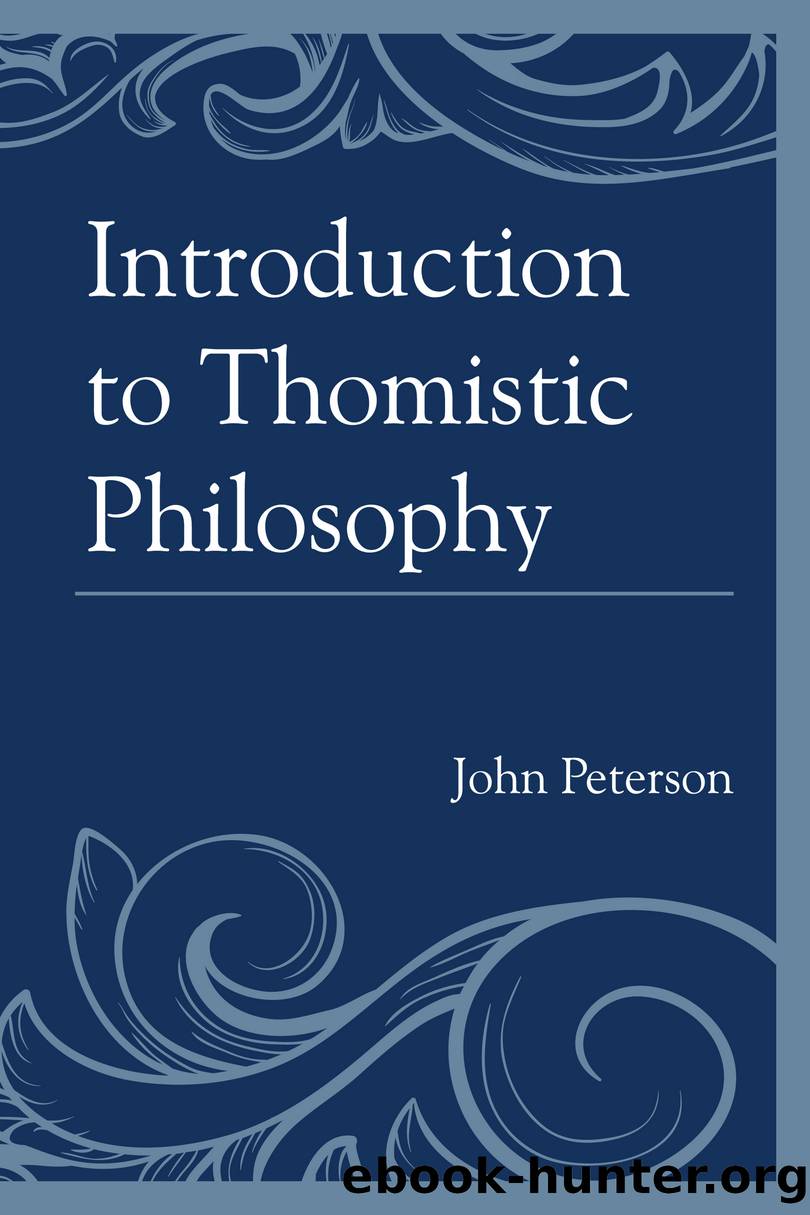Introduction to Thomistic Philosophy by Peterson John;

Author:Peterson, John;
Language: eng
Format: epub
Publisher: UPA
Summary
It was shown that for Aquinas, the Aristotelian idea of truth as the conformity of mind to thing is too narrow. More broadly, truth for him is the conformity of mind and thing[52] , a definition which allows the conformity to run in both directions, i.e. from mind to thing in theoretical truth and from thing to mind in practical truth. Moreover, in adopting this broader definition of truth Aquinas would seem to be justified. For as our example of DaVinci shows, the truth of things is sometimes a condition of the truth of judgment. But no account of this is possible under the view that the truth of things is derivative of the truth of judgment. Second, it was shown that since for Aquinas truth of any sort requires two terms, mind and thing, then in practical or productive truth there can be knowledge without truth. For artists know their own ideal models even when nothing as yet exemplifies those models. For they know those models even before they make the artifacts that are modeled after them. Therefore, whereas practical or productive truth implies knowledge of ideal models, the latter does not imply practical or productive truth. However, in theoretical truth it is the other way around. Since it might express mere true belief as well as knowledge, judgmental truth does not imply knowledge-that. However, knowledge-that does imply judgmental truth. Third, I showed that while for Aquinas the truth of any judgment or proposition P implies neither oneâs knowledge that-P nor oneâs acquaintance with the truth of P, yet, oneâs knowledge that-P both implies and is implied by the conjunct of Pâs truth together with oneâs acquaintance with that truth. Finally, it was shown that Aquinas is right in holding that truth in the primary sense of unmeasured measure is identified with God. For things that are participatively F can only be caused by what is non-participatively F, and this cause must be an efficient as well as an exemplary cause. This unmeasured measure is therefore no separated Form but can only be the Thomistic God who, viewed as participable by creatures, is identified with His divine Ideas.
Download
This site does not store any files on its server. We only index and link to content provided by other sites. Please contact the content providers to delete copyright contents if any and email us, we'll remove relevant links or contents immediately.
The remains of the day by Kazuo Ishiguro(7601)
Tools of Titans by Timothy Ferriss(7003)
The Black Swan by Nassim Nicholas Taleb(6237)
Giovanni's Room by James Baldwin(5938)
Inner Engineering: A Yogi's Guide to Joy by Sadhguru(5931)
The Way of Zen by Alan W. Watts(5829)
The Six Wives Of Henry VIII (WOMEN IN HISTORY) by Fraser Antonia(4815)
The Power of Now: A Guide to Spiritual Enlightenment by Eckhart Tolle(4795)
Astrophysics for People in a Hurry by Neil DeGrasse Tyson(4641)
Asking the Right Questions: A Guide to Critical Thinking by M. Neil Browne & Stuart M. Keeley(4627)
12 Rules for Life by Jordan B. Peterson(3780)
The Ethical Slut by Janet W. Hardy(3534)
Skin in the Game by Nassim Nicholas Taleb(3503)
Housekeeping by Marilynne Robinson(3443)
The Art of Happiness by The Dalai Lama(3409)
Double Down (Diary of a Wimpy Kid Book 11) by Jeff Kinney(3302)
Skin in the Game: Hidden Asymmetries in Daily Life by Nassim Nicholas Taleb(3290)
Walking by Henry David Thoreau(3250)
12 Rules for Life: An Antidote to Chaos by Jordan B. Peterson(3215)
